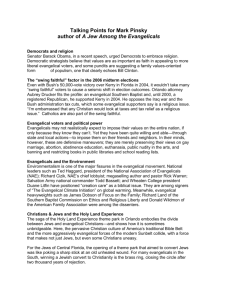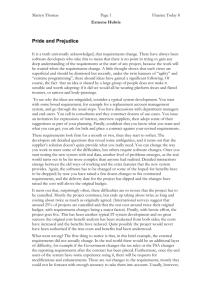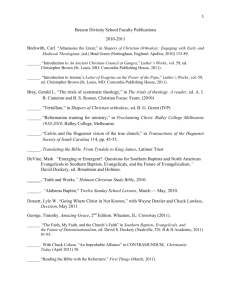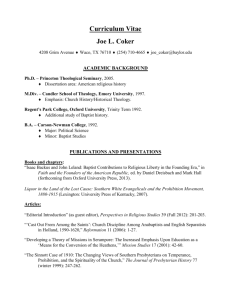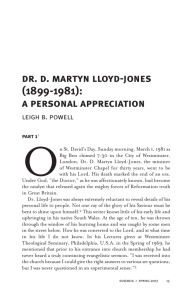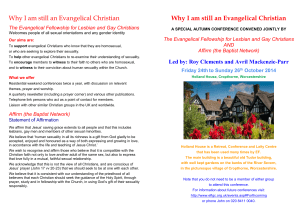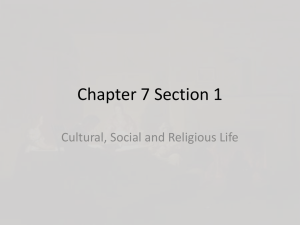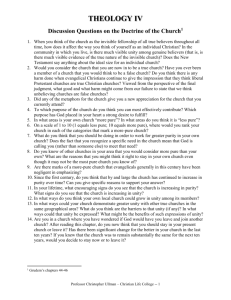Foundations 37 - Autumn 1996.tiff
advertisement
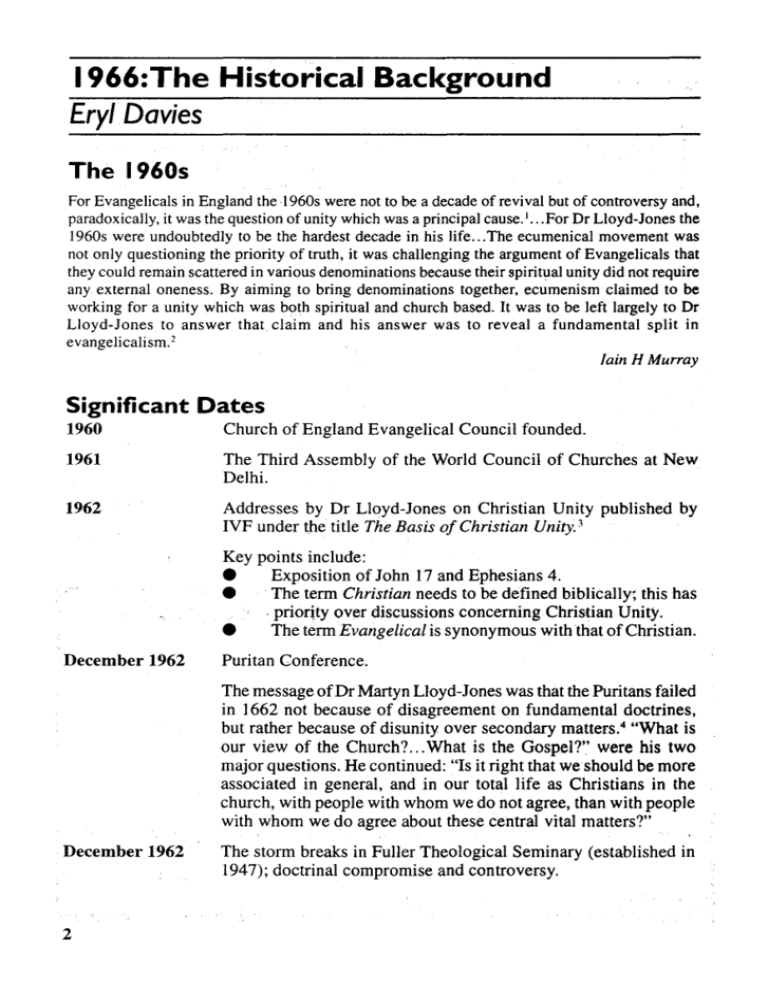
1966:The Historical Background Eryl Davies The 1960s For Evangelicals in England the I 960s were not to be a decade of revival but of controversy and, paradoxically, it was the question of unity which was a principal cause. 1••• For Dr Lloyd-Jones the 1960s were undoubtedly to be the hardest decade in his Iife ... The ecumenical movement was not only questioning the priority of truth, it was challenging the argument of Evangelicals that they could remain scattered in various denominations because their spiritual unity did not require any external oneness. By aiming to bring denominations together, ecumenism claimed to be working for a unity which was both spiritual and church based. It was to be left largely to Dr Lloyd-Jones to answer that claim and his answer was to reveal a fundamental split in evangelicalism. 2 lain H Murray Significant Dates 1960 Church of England Evangelical Council founded. 1961 The Third Assembly of the World Council of Churches at New Delhi. 1962 Addresses by Dr Lloyd-Jones on Christian Unity published by IVF under the title The Basis of Christian Unity.' Key points include: Exposition of John 17 and Ephesians 4. The term Christian needs to be defined biblically; this has . priority over discussions concerning Christian Unity. The term Evangelical is synonymous with that of Christian. e e e December 1962 Puritan Conference. The message ofDr Martyn Lloyd-Jones was that the Puritans failed in 1662 not because of disagreement on fundamental doctrines, but rather because of disunity over secondary matters. 4 "What is our view of the Church? ... What is the Gospel?" were his two major questions. He continued: "Is it right that we should be more associated in general, and in our total life as Christians in the church, with people with whom we do not agree, than with people with whom we do agree about these central vital matters?" December 1962 2 The storm breaks in Fuller Theological Seminary (established in 1947); doctrinal compromise and controversy. 1962-1965 The Second Vatican Council. "Perhaps the most important ecclesiastical event of this century. " 5 Kenneth Hylson-Smith "Vatican 11. . .is the most important event in the history of the Roman Catholic Church since the Protestant Reformation". 6 Giuseppe Alberigo Surprisingly, many Anglican Evangelicals "acknowledged that the Roman Catholic Church held many of the fundamental Christian doctrines so dear to Evangelicals, and the evidence of Biblical reformation was greeted with gladness". 7 Kenneth Hylson-Smith Also note that the charismatic movement, which was interdenominational and focused on common spiritual experiences and gifts rather than theology, encouraged greater cooperation between many Anglican Evangelicals and Roman Catholics. 1963 Honest to God by John AT Robinson was published. A radical, unbiblical book based on German theologians Bultmann, Bonhoeffer and Tillich. 1963 Discussions between Dr Martyn Lloyd-Jones and the evangelist Billy Graham. "I said I'd make a bargain: if he would stop the general sponsorship of his campaigns - stop having liberals and Roman Catholics on the platform- and drop the invitation system, I would wholeheartedly support him and chair the Congress. We talked for about three hours, but he didn't accept these conditions". 8 1963 Mexico City where the WCC Commission on World Mission and Evangelism met. "A new wind began to blow" here and the Gospel began to be politicised. 1964 Fountain Trust founded by Michael Harper. The purpose was to promote and encourage the use of the charismata within the historic denominations. September 1965 The First National Association of Evangelicals (NAS). The Assembly agreed to set up a Commission "to study radically the various attitudes ofEvangelicals to the ecumenical movement, denominationalism and a possible future United Church". November 1965 Westminster Ministers' Fellowship received and discussed a report of the September National Association of Evangelicals. Several members of the Westminster Fellowship, including Dr M LloydJones, agreed to speak to the Commission. 3 December 1965 Puritan Conference on Approaches to the Reformation of the Church. Again the address by Dr Martyn Lloyd-Jones on Ecclesiola in Ecclesia was challenging and thought-provoking; it "broke new ground" .9 He examined several examples of attempts by believers from the Reformation onwards to develop a group of churches within a larger denominational, territorial church; Dr Martyn Lloyd-Jones called them "little churches within a church". According to Dr Martyn Lloyd-Jones such people had given priority to expediency over Biblical principles and failed as a consequence to grapple Biblically with the crucial question relating to the nature of the church. They, as well as ourselves, have forgotten the doctrine of the remnant. He continued: "We are trusting to expediency and expedients and not saying that, if we are faithful, the Holy Spirit has promised to honour us and our testimony however small our numbers and however despised by 'the wise and prudent"'. 10 January 1966 Westminster Chapel, London, where Dr Martyn Lloyd-Jones was minister, refused on doctrinal grounds, to join the newly proposed Congregational Church in England and Wales that later merged with the Presbyterian Church of England to form the United Reformed Church. March 1966 Dr Michael Ramsey, the new Archbishop of Canterbury, made an official visit to the Pope in the Vatican. Pope Paul VI and Archbishop Ramsey issued a Common Declaration aimed at "a restoration of complete communion of faith and sacramental life" between their two churches. The first step was the establishment of the Anglican-Roman Catholic Joint Preparatory Council ( 1967-1968) out of which came the AnglicanRaman Catholic International Commission (ARCIC) from 1971 onwards. September 1966 World Congress on Evangelism in Berlin chaired by Carl Henry. Contrary to some reports, Dr Martyn Lloyd-Jones was not present. 18-20 October 1966 The SecondNationalAssembly ofEvangelicals. Dr Martyn LloydJones's now famous address was given in the first meeting on 18th October. October 1966 The Commission's Report was published to coincide with the NAS. 1967 " .. .impossible to regard American evangelicalism as a single coalition with a more or less unified and recognised leadership" .11 February 1967 The Evangelical Times was launched as a monthly paper. 4 April 1967 Baptist Union Assembly received the published Report of its Council on ecumenism and referred to developing links between denominations and Rome. It warned against Lloyd-Jones's call to leave mixed denominations. April 1967 The first National Evangelical Anglican Congress, Keele under the leadership of John Stott. Dr Ramsey, Archbishop of Canterbury, preached in the opening meeting. This Congress confirmed, commended and popularized the new attitude on the part of evangelical Anglicans towards ecumenism. John Stott writes: "Evangelicals in the Church of England are changing too. Not in doctrinal conviction ... but. . .in stature and posture ... We have acquired a reputation for narrow partisanship and obstructionism ... We need to repent and change" .12 lain Murray reminds us that it was "Ramsey who in the mid-fifties had criticised English evangelicalism as 'heretical' and 'sectarian', who expected to meet atheists in heaven, who took a liberal position on Scripture and a sympathetic view of reunion with Rome". 13 1967 "House" or "New" Churches began to be established in different areas of England. 31st October- 1st November 1967 British Evangelical Council Conference held at Westminster Chapel, London, to mark the 450th anniversary of Luther's 95 theses being nailed to the door of Wittenberg Castle Church. At the last session of the Conference, Dr Martyn Lloyd-Jones spoke on Luther and his Message. 14 Under the sub-title of his conclusion The Lessons for Today, Dr Martyn Lloyd-Jones insists that "the idea that Evangelicals can infiltrate any established church ... and reform it, and turn it into an evangelical body, is midsummer madness. No institution has ever been truly reformed ... This is the verdict of history ... What then are we as Evangelicals to do ... ? ... We must heed a great injunction in Revelation 18:4 'Come out of her, my people!' ... Come out of it! But come together also, come into fellowship with all like-minded Christian people. Come into an association with all like-minded Christian people. Come into an association such as this British Evangelical Council, that stands for the truth and against compromise, hesitation, neutrality ... Come out; come in!". 15 29th May 1968 Lloyd-Jones, convalescing after major surgery, informs his church deacons of his intention to retire late August from pastoral charge after 30 years ministry in Westminster. 5 July 1968 From the Fourth Assembly of the WCC at Uppsala, great efforts were made to involve the wee and its member churches more completely in achieving social, political changes. "Events at Uppsala had signalled the direction". 16 13 November 1968 Dr Martyn Lloyd-Jones spoke on the question What is the church? 11 at the BEC Conference in Liverpool. Herbert Carson also spoke on the question, What is a Christian? References 1 2 3 4 5 6 7 8 9 10 11 12 13 14 15 16 17 lain Murray, D Martyn Lloyd-Jones: The Fight ofFaith 1939-1981, Banner of Truth, 1990, volume 2,p.427 Idem, p. 425 Reprinted in Dr Martyn Lloyd-Jones, Knowing the Tzmes: Addresses delivered on various occasions 1942-1977, Banner of Truth, 1989, (see especially pp. 118-163) Op. cit., p. 433 Kenneth Hylson-Smith, The Evangelicals in the Church ofEngland 1734-1984, T&T Clark, 1988, p. 343 Giuseppe A1berigo, The Reception of Vatican 11, Bums & Oates, 1987, p. vii The Evangelicals in the Church of England 1734-1984 The Fight of Faith, p 440, quoted from an original interview between Car! FH Henry and Dr M Lloyd-Jones in Christianity Today, February 8, 1980, p. 29 Idem, p. 509 Ibid. George M Marsden, Understanding Fundamentalism and Evangelicalism, Eerdmans, 1991, p. 74 Keele '67, The National Evangelical Anglican Congress Statement, ed. Philip Crowe, 1967, p. 8 Op. cit., p. 539 Available in Dr Martyn Lloyd-Jones: Unity in Truth, ed. Hywel R Jones, Evangelical Press, 1991, pp. 20-44. This is essential reading! Idem, p. 43 H Hoekstra, Evangelism in Eclipse, Paternoster Press, p. Ill Dr Martyn Lloyd-Jones: Unity in Truth, pp. 45-65 Dr Eryl Davies is the Principal of the Evangelical Theological College of Wales Now what we are constantly being told is this, that we should work together, and evangelise together in particular, and not be bothered about these discussions about the nature of the Church and our differentviews. But this is a very false argument it seems to me. How can you evangelise truly unless you are agreed about the evangel? It seems to me to be a sheer impossibility. "If the trumpet yield an uncertain sound, who shall prepare him for the battle?" What is the gospel? I have often said that I am not surprised that the majority of people in this country today are outside the Christian Church. As they listen to the talks on the television and the wireless, and read in the newspapers, these contradictory statements that are made in the name of the Christian Church with regard the gospel of Jesus Christ how can they listen truly? The confusion in which they are to be found is a confusion that is caused by the Church herself and her discordant and contradictory voices. So I suggest that failure to be clear about the doctrine of the Church is one of the greatest hindrances to true evangelism at this present time. DM Lloyd-Jones, What is the Church? in Unity in Truth 6

